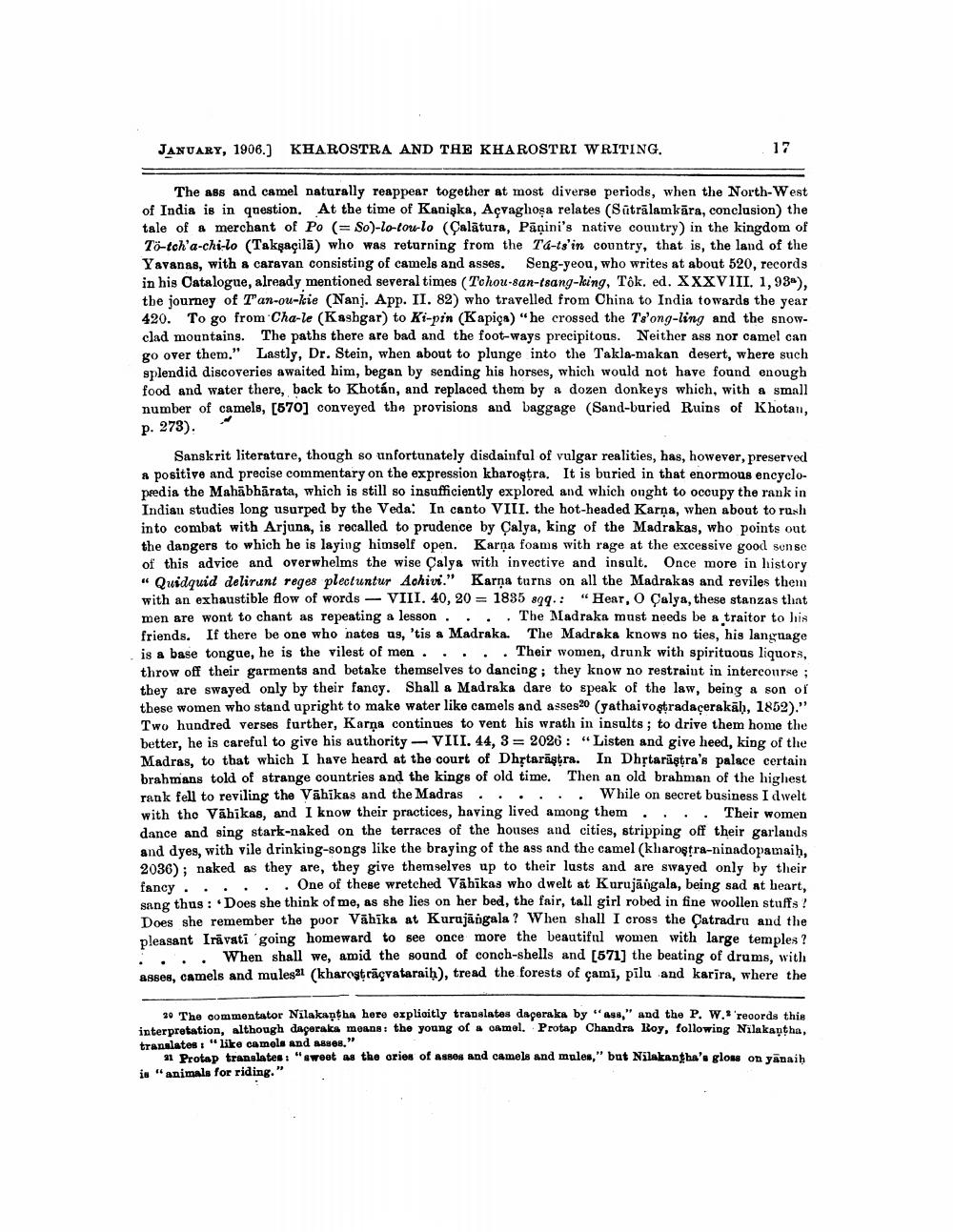________________
JANUARY, 1906.) KHAROSTRA AND THE KHAROSTRI WRITING.
17
The abs and camel naturally reappear together at most diverse periods, when the North-West of India is in question. At the time of Kaniska, Açvaghoşa relates (Satrālamkāra, conclusion, the tale of a merchant of Po (= So)-lo-tou-lo (Calātura, Pāņini's native country) in the kingdom of Tö-tch'a-chi-lo (Takşaçilā) who was returning from the Ta-ts'in country, that is, the land of the Yavanas, with a caravan consisting of camels and asses. Seng-yeou, who writes at about 520, records in his Catalogue, already mentioned several times (Tchou-san-sang-king, Tôk, ed. XXXVIII. 1,93a), the journey of Tan-ou-kie (Nanj. App. II. 82) who travelled from China to India towards the year 420. To go from Cha-le (Kashgar) to Ki-pin (Kapiça) "he crossed the T's'ong-ling and the snowclad mountains. The paths there are bad and the foot-ways precipitous. Neither ass nor camel can go over them." Lastly, Dr. Stein, when about to plunge into the Takla-makan desert, where such splendid discoveries awaited him, began by sending his horses, which would not have found enough food and water there, back to Khotán, and replaced them by a dozen donkeys which, with a small number of camels, (570] conveyed the provisions and baggage (Sand-buried Ruins of Khotan, p. 273).
Sanskrit literature, though so unfortunately disdainful of vulgar realities, has, however, preserved a positive and precise commentary on the expression kharoştra. It is buried in that enormous encyclopedia the Mahābhārata, which is still so insufficiently explored and which ought to occupy the rank in Indian studies long usurped by the Veda: In canto VIII. the hot-headed Karna, when about to rush into combat with Arjuna, is recalled to prudence by Çalya, king of the Madrakas, who points out the dangers to which be is laying himself open. Karna foams with rage at the excessive good sunsc of this advice and overwhelms the wise Calya with invective and insult. Once more in history " Quidquid delirant reges plectuntur Achivi." Karna turns on all the Madrakas and reviles them with an exhaustible flow of words — VIII. 40, 20 = 1835 899.: "Hear, 0 Çalya, these stanzas that men are wont to chant as repeating a lesson. ... The Madraka must needs be a traitor to his friends. If there be one who nates us, 'tis a Madraka. The Madraka knows no ties, his language is a base tongue, he is the vilest of men..... Their women, drunk with spirituous liquors, throw off their garments and betake themselves to dancing; they know no restraint in intercourse ; they are swayed only by their fancy. Shall a Madraka dare to speak of the law, being a son of these women who stand upright to make water like camels and asses20 (yathaivostradacerakāh, 1852)." Two hundred verses further, Karna continues to vent his wrath in insults; to drive them home the better, he is careful to give his authority - VIII. 44, 3= 2026: "Listen and give heed, king of the Madras, to that which I have heard at the court of Dhstarāştra. In Dhịtarāştra's palace certain brahmans told of strange countries and the kings of old time. Then an old brahman of the highest rank fell to reviling the Vāhīkas and the Madras .....While on secret business I dwelt with the Vähikas, and I know their practices, having lived among them .
Their women dance and sing stark-naked on the terraces of the houses and cities, stripping off their garlands and dyes, with vile drinking-songs like the braying of the ass and the camel (kharogtra-ninadopamaih, 2036); naked as they are, they give themselves up to their lusts and are swayed only by their fancy . . . . . . One of these wretched Vähikas who dwelt at Kurujangala, being sad at heart, sang thus: Does she think of me, as she lies on her bed, the fair, tall girl robed in fine woollen stuffs ! Does she remember the poor Vähika at Kurajāigala ? When shall I cross the Catradru and the pleasant Irāvati 'going homeward to see once more the beautiful women with large temples ?
When shall we, amid the sound of conch-shells and [571] the beating of drums, with asses, camels and mules21 (kharogtrācvataraih), tread the forests of cami, pilu and karira, where the
30 The commentator Nīlakantha here explicitly translates daceraka by "195," and the P, W.* 'records thie interpretation, although dageraka means: the young of a oamel. Protap Chandra Roy, following Nilakantha, translates: "like camels and asses."
1 Protap translates: "sweet as the ories of asses and camels and males," but Nilakantha's gloss on yānaih is "animals for riding."




